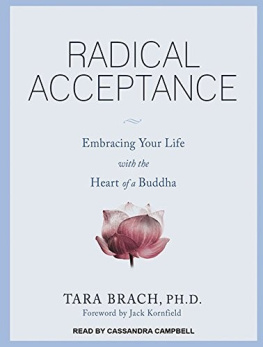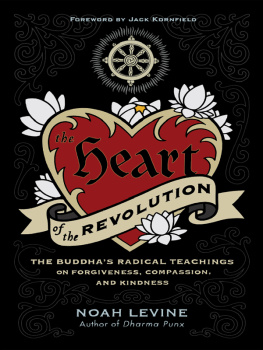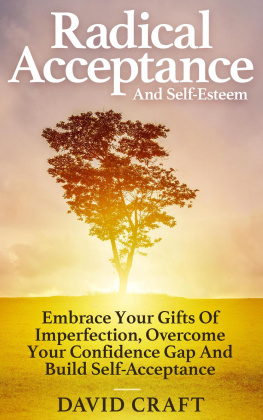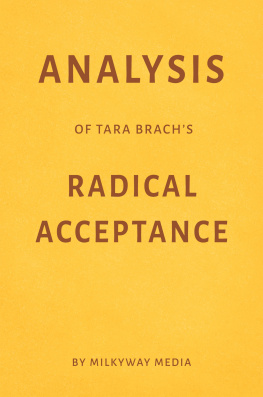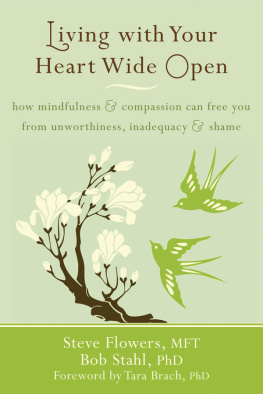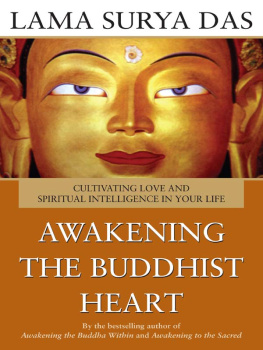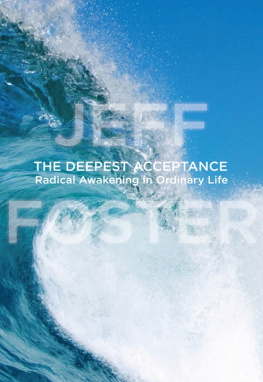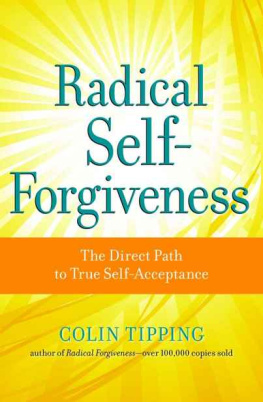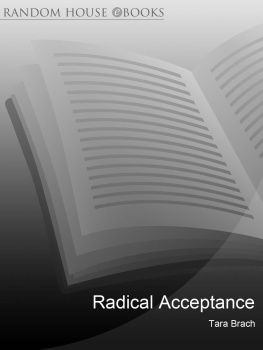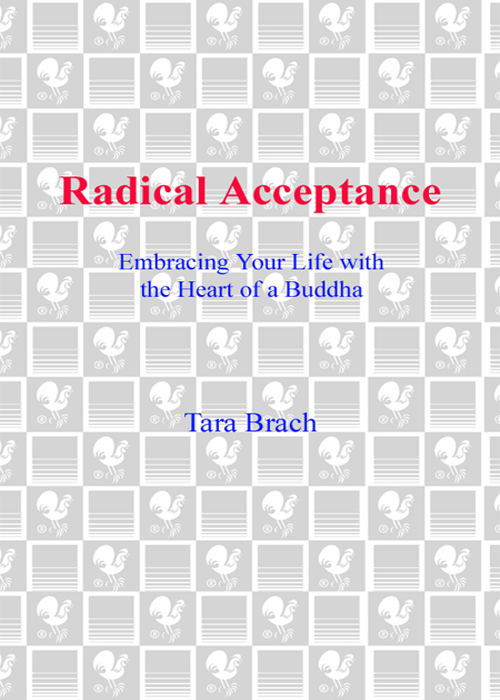
RADICAL
ACCEPTANCE

Embracing Your Life with the Heart of aBuddha

TARA BRACH, PH.D.

BANTAM BOOKS
NEWYORK TORONTO LONDON SYDNEY AUCKLAND
Contents
To my parents, who have graced mylife
with their generous, loving hearts.
Out beyond ideas of wrongdoingand rightdoing,
there is a field. Ill meet youthere.
When the soul lies down in thatgrass,
the world is too full to talk about.
Ideas, language, even the phrase each other
doesnt make any sense.
Rumi
FOREWORD

You hold in your hands a beautiful invitation: to rememberthat it is possible to live your life with the wise and tender heart of aBuddha. In Radical Acceptance, Tara Brach graciously offers bothhealing words and transformative understanding, the fruits of her many years asa beloved meditation teacher and psychotherapist. Because she has immersedherself in the day-to-day work of reclaiming human dignity with heartfeltcompassion and forgiveness, Taras teachings are immediate and tangible;they melt the barriers that keep us from being fully alive.
In astressful and competitive modern society that has fostered unworthiness,self-judgment and loss of the sacred for so many, the principles of RadicalAcceptance articulated here are essential for reclaiming a joyful and liberatedlife. Through her rich stories and accounts of students and clients, throughTaras own personal journey and through the clear, systematic practicesshe offers, Radical Acceptance shows us wise ways to nurtureourselves, transform our sorrows and reclaim our wholeness.
Mostimportantly, Radical Acceptance reawakens us to our Buddha nature, thefundamental happiness and freedom that are the birthright of every human being.Read these pages slowly. Take their words and practices to heart. Let themguide you and bless your path.
Jack Kornfield
Spirit Rock Center
February 2003
PROLOGUE

SOMETHING IS WRONG
WITH ME
When Iwas in college, I went off to the mountains for a weekend of hiking with anolder, wiser friend of twenty-two. After we set up our tent, we sat by astream, watching the water swirl around rocks and talking about our lives. Atone point she described how she was learning to be her own bestfriend. A huge wave of sadness came over me, and I broke down sobbing. Iwas the furthest thing from my own best friend. I was continually harassed byan inner judge who was merciless, relentless, nit-picking, driving, ofteninvisible but always on the job. I knew I would never treat a friend the way Itreated myself, without mercy or kindness.
My guiding assumption wasSomething is fundamentally wrong with me, and I struggled tocontrol and fix what felt like a basically flawed self. I drove myself inacademics, was a fervent political activist and devoted myself to a very fullsocial life. I avoided pain (and created more) with an addiction to food and apreoccupation with achievement. My pursuit of pleasure was sometimeswholesomein nature, with friendsbut it also included an impulsivekind of thrill-seeking through recreational drugs, sex, and other adventures.In the eyes of the world, I was highly functional. Internally, I was anxious,driven and often depressed. I didnt feel at peace with any part of mylife.
Feeling not okay went hand in hand with deep loneliness. In myearly teens I sometimes imagined that I was living inside a transparent orbthat separated me from the people and life around me. When I felt good aboutmyself and at ease with others, the bubble thinned until it was like aninvisible wisp of gas. When I felt bad about myself, the walls got so thick itseemed others must be able to see them. Imprisoned within, I felt hollow andachingly alone. The fantasy faded somewhat as I got older, but I lived with thefear of letting someone down or being rejected myself.
With my collegefriend it was differentI trusted her enough to be completely open. Overthe next two days of hiking on high mountain ridges, sometimes talking withher, sometimes sitting in silence, I began to realize that beneath all my moodswings, depression, loneliness and addictive behavior lurked that feeling ofdeep personal deficiency. I was getting my first clear glimpse into a core ofsuffering that I would revisit again and again in my life. While I felt exposedand raw, I intuitively knew that by facing this pain I was entering a path ofhealing.
As we drove down from the mountains that Sunday night, myheart was lighter but still aching. I longed to be kinder to myself. I longedto befriend my inner experience and to feel more intimacy and ease with thepeople in my life.
When some years later these longings drew me to theBuddhist path, I found there the teachings and practices that enabled me todirectly face my feelings of unworthiness and insecurity. They gave me a way ofseeing clearly what I was experiencing and showed me how to relate to my lifewith compassion. The teachings of the Buddha also helped undo my painful andmistaken notion that I was alone in my suffering, that it was a personalproblem and somehow my fault.
Over the past twenty years, as apsychologist and Buddhist teacher, Ive worked with thousands of clientsand students who have revealed how painfully burdened they feel by a sense ofnot being good enough. Whether our conversation takes place in the middle of aten-day meditation retreat or during a weekly therapy session, thesufferingthe fear of being flawed and unworthyis basically thesame.
For so many of us, feelings of deficiency are right around thecorner. It doesnt take muchjust hearing of someone elsesaccomplishments, being criticized, getting into an argument, making a mistakeat workto make us feel that we are not okay.
As a friend of mineput it, Feeling that something is wrong with me is the invisible andtoxic gas I am always breathing. When we experience our lives throughthis lens of personal insufficiency, we are imprisoned in what I call thetrance of unworthiness. Trapped in this trance, we are unable to perceive thetruth of who we really are.
A meditation student at a retreat I wasteaching told me about an experience that brought home to her the tragedy ofliving in trance. Marilyn had spent many hours sitting at the bedside of herdying motherreading to her, meditating next to her late at night,holding her hand and telling her over and over that she loved her. Most of thetime Marilyns mother remained unconscious, her breath labored anderratic. One morning before dawn, she suddenly opened her eyes and lookedclearly and intently at her daughter. You know, she whisperedsoftly, all my life I thought something was wrong with me.Shaking her head slightly, as if to say, What a waste, she closedher eyes and drifted back into a coma. Several hours later she passedaway.
We dont have to wait until we are on our deathbed torealize what a waste of our precious lives it is to carry the belief thatsomething is wrong with us. Yet because our habits of feeling insufficient areso strong, awakening from the trance involves not only inner resolve, but alsoan active training of the heart and mind. Through Buddhist awareness practices,we free ourselves from the suffering of trance by learning to recognize what istrue in the present moment, and by embracing whatever we see with an openheart. This cultivation of mindfulness and compassion is what I call RadicalAcceptance.
Next page

